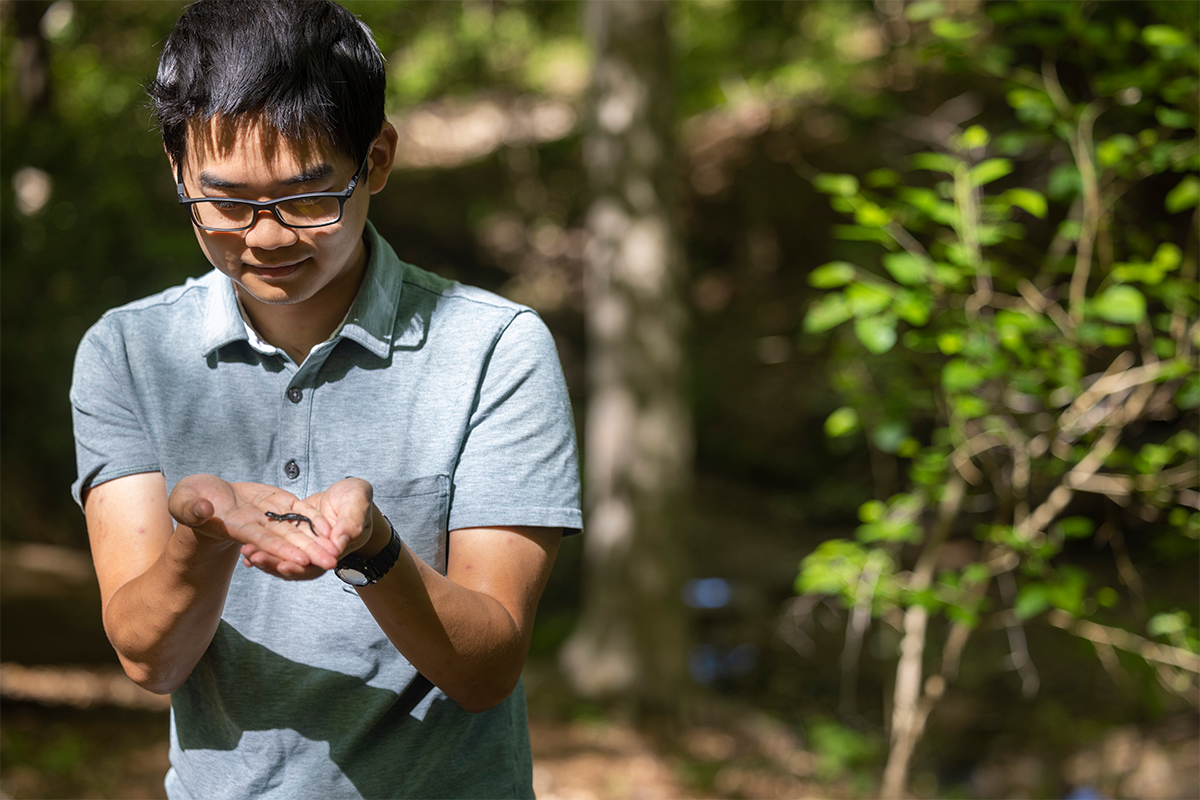Nick Chang, who just completed his second year at Emory, has been selected as the university’s first winner of the competitive Ernest F. Hollings undergraduate scholarship since 2007.
Chang, an environmental sciences major, is just the third Emory College student to win the scholarship from the National Oceanic and Atmospheric Administration (NOAA) that recognizes exceptional students in a broad range of science and math fields.
The award comes with $9,500 a year for two years of undergraduate study; a 10-week, full-time, paid summer internship at a NOAA facility in the United States; and funding for research presentation at two national scientific conferences.
“I get a lot of fulfillment from seeing things that come from my work in ways that benefit local communities and ecosystems,” Chang says. “I love being able to do research that has an applied outcome. That’s what drew me to the Hollings because whatever research I get to do, it will have an actual impact.”
If not whales, then salamanders
Chang has made an impression at Emory in just two years, but his interest in ecology and biology began as a young child in Florida fascinated with whales. Without ready access to the ocean, Chang settled on investigating the lizards in his backyard to feed his curiosity.
When his family moved to North Carolina and then Wisconsin, Chang’s gaze shifted to salamanders. As he learned more about cellular biology and climate change, his interest became concern about how the increased temperatures, humidity and pollution hurt the amphibians, many of which can breathe through their skin.
Chang arrived at Emory when it was quieter than usual due to the ongoing pandemic, giving him the opportunity to roam over the Atlanta campus, including Lullwater Preserve, trying to understand the local environment.
He approached John Wegner, a senior lecturer in environmental sciences, about potential breeding ponds where he could search for a spotted salamander. The nocturnal species, while common, can be difficult to find because of its dark skin.
Wegner said he hadn’t spotted one in years and suggested Chang survey campus for the species. Chang turned in a 60-page paper, a full survey of every species at Emory. No one had done that before.
“What really makes Nick special is that curiosity and being willing to talk to anybody to get the answers he values,” Wegner says. “It is amazing how much he is able to get done.”
Though he was quickly becoming known as Salamander Guy, wearing muddy boots and toting a bucket into different forests, Chang continued to expand his interests.
Searching for the amphibians gave him repeated exposure to new plants, which he learned to identify on his own, and habitat degradation on campus. He merged that knowledge with a growing understanding of ecological theory from his courses.
A role in the university’s forest management plan
He put his knowledge to use on campus by joining the University Senate Committee on the Environment. He is conducting ecological assessments — looking at invasive plants, storm water runoff, recreational trails and other systems that interact in an urban landscape — to help draft a proposed revision of the university’s forest management plan.
Though the plan focuses on big questions about university land use, Chang has taken time to focus on small details. He worked with students in the Emory Ecological Society he founded to coordinate DeKalb County contractors, the Amphibian Foundation and Campus Services to safely relocate salamander egg masses and protect breeding pools threatened by construction at Lullwater.
“When he cares about something, Nick acts and coordinates in a very sophisticated way to get things done,” says Carolyn Keogh, a lecturer in environmental sciences who also serves as chair of the Senate Committee on the Environment. “Nick is making this great stewardship happen in real time.”
Busy summers of study
This summer, Chang will look at heavy metal contamination in metro Atlanta streams as a Summer Undergraduate Research Experience (SURE) researcher. If he finds slag in the waterways, Chang hopes to then study whether the metals are accumulating in invasive river clams.
He hopes to continue a similar sort of ecological assessment from a management perspective next summer, when he will work at a NOAA facility as a Hollings Scholar.
Chang will learn about those internship opportunities next fall. He is open to conducting research on marine invertebrates or fish, especially in terms of environmental management.
He does have one idea to at least ask about from his readings. There is a species of salamander found only in parts of California and Canada’s Vancouver Island — but not in between.
Genetic evidence suggests the amphibians originated in California and somehow floated to the island, even though salt water would kill them through their sensitive skin. Understanding the species’ distribution would require extensive hands-on field research.
“It’s the kind of mystery I find interesting,” Chang says. “It’s their cryptic behavior that makes them so unnoticed and underappreciated.”


